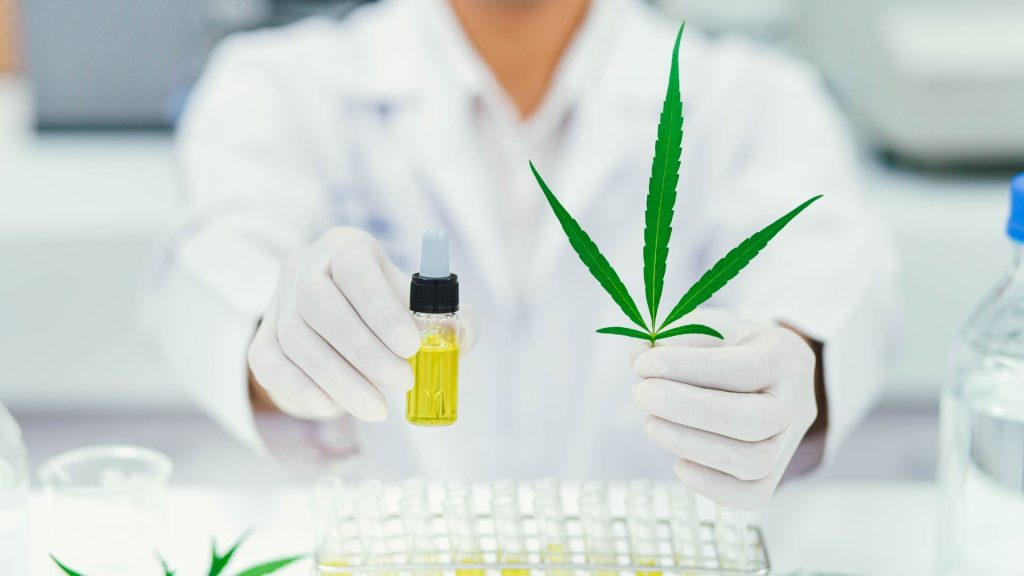
CBD interacts with receptors in the brain to possibly reduce anxiety, depression, psychosis and other mood disorders. Studies have also demonstrated its beneficial properties to promote healthy sleep habits and lessen PTSD symptoms.
CBD significantly decreased pain levels associated with rheumatoid arthritis patients and improved their quality of life in one placebo-controlled study, and another study demonstrated its effect on decreasing disease activity while increasing quality of life for participants taking Sativex, another CBD medication.
Anxiety
CBD has been proven to ease anxiety symptoms in multiple studies. This may be because CBD acts as an indirect agonist of the 5HT1a serotonin receptor, helping regulate mood and decrease anxiety symptoms.
Anxiety disorders are among the most prevalent mental health conditions, including phobias, obsessive-compulsive disorder, generalized anxiety disorder and social anxiety disorder. According to a survey published in 2022, over one sixth of people who used CBD reported it helped manage their anxiety.
Medical professionals sometimes recommend CBD for seizures in children diagnosed with Dravet syndrome and Lennox-Gastaut syndrome who do not respond to traditional antiseizure medication. Trials show that Epidiolex containing mostly CBD was effective at decreasing seizures for these children significantly.
If you are taking CBD to treat anxiety or depression, be sure to inform your physician so they can assist in finding an appropriate dose and ensure it doesn’t interact negatively with any medications or supplements you are already taking.
Depression
Multiple studies have demonstrated CBD’s anxiolytic effects. One involved 57 participants given either an oral dose of CBD or placebo; those given CBD experienced significantly lower anxiety levels. CBD also helped reduce nightmares and replaying negative memories in other studies; its anxiolytic properties may be due to epigenetic mechanisms, such as DNA methylation or histone modification, regulation of miRNA expression or both.
Research also suggests that CBD could aid depression by increasing serotonin receptors. Low serotonin has been linked with mood disorders and anxiety; CBD has been proven to improve sleep, helping decrease both anxiety and depression symptoms. Furthermore, many psychiatric patients using self-treatment with CBD for depression or anxiety use this method as self-medication – psychiatrists must be aware of this phenomenon and the potential therapeutic benefits; additionally it’s essential they know any risks or side effects associated with using non-approved substances for self-medication by their patients.
Seizures
CBD has been shown to effectively decrease seizures in various studies. One randomized controlled trial revealed that CBD reduced drop seizures among people living with LGS more effectively than placebo.
Studies conducted with CBD found it reduced seizure frequency among those suffering from Dravet syndrome who weren’t responding to standard antiseizure medications, reduced sedation levels and enhanced sleep quality.
CBD provides significant anxiolytic effects in models of generalized anxiety as well as in the midbrain dorsal periaqueductal gray (DPAG), an area implicated in fear responses. When administered via microinjection into this region, microinjection of CBD reduces anticipatory and motor responses, including agitation and dread.
CBD may help treat epilepsy in children suffering from Dravet syndrome and Lennox-Gastaut syndrome who do not respond to standard antiseizure medications, like Epidiolex. While further research needs to be conducted on how exactly endocannabinoids help counter seizures as well as how specifically CBD reduces seizures, Epidiolex has already been approved by the FDA as a pharmaceutical grade CBD product and thus serves this need. Ultimately however, further investigation will need to be performed into exactly how exactly CBD reduces seizures by its mechanisms of action as well.
Pain
CBD helps reduce inflammation, which in turn helps alleviate pain levels. Furthermore, it lowers biochemicals associated with inflammation such as glutamate.
CBD inhibits a3-glycine receptors responsible for sensing pain in the nervous system. Studies performed on laboratory animals demonstrated that CBD significantly reduced nerve damage-induced pain, as well as anxiety levels when exposed to high stress environments.
Forbes Health recognizes cannabis-derived supplements such as CBD as possible ways of relieving health conditions; it’s best to consult your physician first before trying any supplements or cannabis-based therapies.
Epidiolex, FDA’s approved CBD prescription medication, helps reduce and even stop seizures for people living with Lennox-Gastaut syndrome or Dravet syndrome of childhood epilepsy. CBD may also help relieve some symptoms associated with rheumatoid arthritis, including pain and swelling; according to a 2020 study topical CBD was significantly reduce painful and itchy sensations for neuropathy sufferers.


